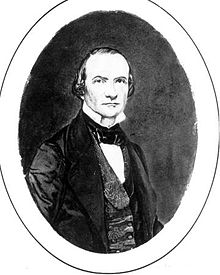Francis W. Eppes | |
|---|---|
 | |
| Intendant of Tallahassee, Florida | |
| In office 1841–1844 | |
| Preceded by | Leslie A. Thompson |
| Succeeded by | James A. Berthelot |
| In office 1856–1857 | |
| Preceded by | Thomas Hayward |
| Succeeded by | D. P. Hogue |
| In office 1866–1866 | |
| Preceded by | P. T. Pearce |
| Succeeded by | D. P. Hogue |
| Personal details | |
| Born | September 20, 1801 Monticello, Virginia, U.S. |
| Died | May 30, 1881 (aged 79) Orlando, Florida, U.S. |
| Spouses | Mary Elizabeth Cleland Randolph
(m. 1822; died 1835)Susan Margaret Ware Crouch
(m. 1837; died 1881) |
| Children | 13 |
| Parent(s) | John Wayles Eppes Mary Jefferson Eppes |
| Occupation | Politician |
Francis Wayles Eppes (September 20, 1801 – May 30, 1881) was a planter and slave owner from Virginia who became a cotton planter in Florida Territory and later civic leader in Tallahassee and surrounding Leon County, Florida. After reaching legal age and marrying, Eppes operated the Poplar Forest plantation which his grandfather President Thomas Jefferson had established in Bedford County, Virginia, which he inherited. However, in 1829 he moved with his family to near Tallahassee, Florida. Long interested in education, in 1856 Eppes donated land and money to designate a school in Tallahassee as one of the first two state-supported seminaries, now known as Florida State University. He served as president of its board of trustees for eight years.[1]
- ^ Napton, WB, Phillips, C & Pendleton, JL 2005, The Union on Trial: The Political Lournals of Judge William Barclay Napton, 1829–1883, University of Missouri Press